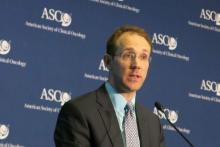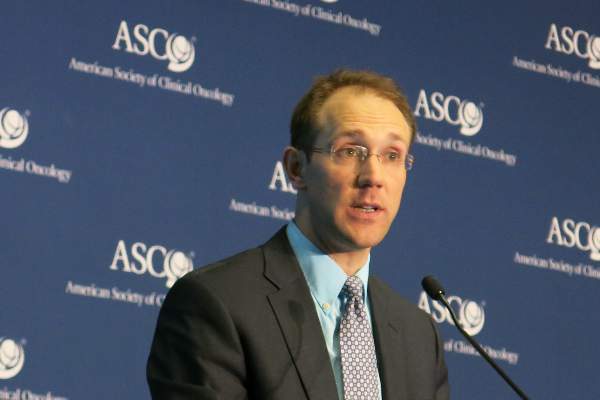User login
CHICAGO – One in four patients with recurrent or metastatic head and neck cancer respond to anti-PD-1 immunotherapy with pembrolizumab, according to preliminary expanded cohort results from KEYNOTE-012.
Among 117 evaluable patients, the objective response rate with pembrolizumab (Keytruda) was 24.8%, including 1 complete response and 28 partial responses.
Pembrolizumab was active in both human papillomavirus-negative and HPV-positive tumors, with response rates of 27.2% and 20.6%.
The efficacy is remarkable in this setting and when measured by response, pembrolizumab seems to be roughly twice as effective as cetuximab, our only targeted therapy, study author Dr. Tanguy Seiwert said during a press briefing in advance of his presentation at the annual meeting of the American Society of Clinical Oncology.
In the pivotal EXTREME trial leading to cetuximab’s approval, 36% of patients responded to cetuximab (Erbitux), when the epidermal growth factor receptor inhibitor was added to platinum-based chemotherapy in recurrent or metastatic squamous cell carcinoma of the head and neck (SCCHN) . Only 10%-13% of patients, however, respond to single-agent cetuximab. Also, several recent studies, with the exception of a retrospective EXTREME analysis, suggest cetuximab efficacy varies with HPV status, Dr. Seiwert, from the University of Chicago, said in an interview.
Pembrolizumab was the first anti-programmed death (PD)-1 therapy to reach the market, following its September 2014 approval for use in metastatic melanoma.
The phase Ib, multi-cohort KEYNOTE-012 enrolled patients with advanced solid tumors and previously reported a 20% response rate with pembrolizumab 10 mg/kg every 2 weeks in recurrent or metastatic SCCHN enriched for PD-L1-positive tumors.
For the expansion cohort, 132 patients with recurrent or metastatic SCCHN were enrolled, irrespective of PD-L1 expression or HPV status, and pembrolizumab was given at a fixed dose of 200 mg every 3 weeks. Their mean age was 59 years and nearly 60% had received two or more prior lines of therapy. The primary end point was objective response rate per investigator assessment using RECIST v1.1.
Overall, 56% of patents experienced some tumor shrinkage. The median time to response was 9 weeks (range, 7.6-18 weeks).
Responses were durable, with 86% of responding patients remaining in response, Dr. Seiwert said. Overall, 40 patients are still on therapy, Dr. Seiwert said.
Data reported in a separate study at the meeting suggest that a novel interferon-gamma expression signature may be useful in predicting which patients are likely to benefit from therapy, with a negative predictive value of 95% and positive predictive value of 40%, he said.
Adverse events were reported in 60% of all 132 patients, most commonly fatigue, hypothyroidism, and decreased appetite. Serious grade 3-4 drug-related events were reported in 13 patients and included pneumonitis in 2 and facial swelling in 2.
ASCO expert Dr. Gregory Masters, of Christiana Care Health System in Newark, DE., commented in a statement that, “This is yet another example where PD-1 immunotherapy might work better and more reliably than existing drugs, and with fewer side effects. The diversity of patients who responded is greater than in any previous trials.”
Dr. Masters added that larger studies and longer follow-up are needed to assess the impact of treatment on patient survival.
Pembrolizumab is being evaluated against standard therapy in recurrent or metastatic head and neck cancer in two phase III trials, KEYNOTE-040 and KEYNOTE-048.
CHICAGO – One in four patients with recurrent or metastatic head and neck cancer respond to anti-PD-1 immunotherapy with pembrolizumab, according to preliminary expanded cohort results from KEYNOTE-012.
Among 117 evaluable patients, the objective response rate with pembrolizumab (Keytruda) was 24.8%, including 1 complete response and 28 partial responses.
Pembrolizumab was active in both human papillomavirus-negative and HPV-positive tumors, with response rates of 27.2% and 20.6%.
The efficacy is remarkable in this setting and when measured by response, pembrolizumab seems to be roughly twice as effective as cetuximab, our only targeted therapy, study author Dr. Tanguy Seiwert said during a press briefing in advance of his presentation at the annual meeting of the American Society of Clinical Oncology.
In the pivotal EXTREME trial leading to cetuximab’s approval, 36% of patients responded to cetuximab (Erbitux), when the epidermal growth factor receptor inhibitor was added to platinum-based chemotherapy in recurrent or metastatic squamous cell carcinoma of the head and neck (SCCHN) . Only 10%-13% of patients, however, respond to single-agent cetuximab. Also, several recent studies, with the exception of a retrospective EXTREME analysis, suggest cetuximab efficacy varies with HPV status, Dr. Seiwert, from the University of Chicago, said in an interview.
Pembrolizumab was the first anti-programmed death (PD)-1 therapy to reach the market, following its September 2014 approval for use in metastatic melanoma.
The phase Ib, multi-cohort KEYNOTE-012 enrolled patients with advanced solid tumors and previously reported a 20% response rate with pembrolizumab 10 mg/kg every 2 weeks in recurrent or metastatic SCCHN enriched for PD-L1-positive tumors.
For the expansion cohort, 132 patients with recurrent or metastatic SCCHN were enrolled, irrespective of PD-L1 expression or HPV status, and pembrolizumab was given at a fixed dose of 200 mg every 3 weeks. Their mean age was 59 years and nearly 60% had received two or more prior lines of therapy. The primary end point was objective response rate per investigator assessment using RECIST v1.1.
Overall, 56% of patents experienced some tumor shrinkage. The median time to response was 9 weeks (range, 7.6-18 weeks).
Responses were durable, with 86% of responding patients remaining in response, Dr. Seiwert said. Overall, 40 patients are still on therapy, Dr. Seiwert said.
Data reported in a separate study at the meeting suggest that a novel interferon-gamma expression signature may be useful in predicting which patients are likely to benefit from therapy, with a negative predictive value of 95% and positive predictive value of 40%, he said.
Adverse events were reported in 60% of all 132 patients, most commonly fatigue, hypothyroidism, and decreased appetite. Serious grade 3-4 drug-related events were reported in 13 patients and included pneumonitis in 2 and facial swelling in 2.
ASCO expert Dr. Gregory Masters, of Christiana Care Health System in Newark, DE., commented in a statement that, “This is yet another example where PD-1 immunotherapy might work better and more reliably than existing drugs, and with fewer side effects. The diversity of patients who responded is greater than in any previous trials.”
Dr. Masters added that larger studies and longer follow-up are needed to assess the impact of treatment on patient survival.
Pembrolizumab is being evaluated against standard therapy in recurrent or metastatic head and neck cancer in two phase III trials, KEYNOTE-040 and KEYNOTE-048.
CHICAGO – One in four patients with recurrent or metastatic head and neck cancer respond to anti-PD-1 immunotherapy with pembrolizumab, according to preliminary expanded cohort results from KEYNOTE-012.
Among 117 evaluable patients, the objective response rate with pembrolizumab (Keytruda) was 24.8%, including 1 complete response and 28 partial responses.
Pembrolizumab was active in both human papillomavirus-negative and HPV-positive tumors, with response rates of 27.2% and 20.6%.
The efficacy is remarkable in this setting and when measured by response, pembrolizumab seems to be roughly twice as effective as cetuximab, our only targeted therapy, study author Dr. Tanguy Seiwert said during a press briefing in advance of his presentation at the annual meeting of the American Society of Clinical Oncology.
In the pivotal EXTREME trial leading to cetuximab’s approval, 36% of patients responded to cetuximab (Erbitux), when the epidermal growth factor receptor inhibitor was added to platinum-based chemotherapy in recurrent or metastatic squamous cell carcinoma of the head and neck (SCCHN) . Only 10%-13% of patients, however, respond to single-agent cetuximab. Also, several recent studies, with the exception of a retrospective EXTREME analysis, suggest cetuximab efficacy varies with HPV status, Dr. Seiwert, from the University of Chicago, said in an interview.
Pembrolizumab was the first anti-programmed death (PD)-1 therapy to reach the market, following its September 2014 approval for use in metastatic melanoma.
The phase Ib, multi-cohort KEYNOTE-012 enrolled patients with advanced solid tumors and previously reported a 20% response rate with pembrolizumab 10 mg/kg every 2 weeks in recurrent or metastatic SCCHN enriched for PD-L1-positive tumors.
For the expansion cohort, 132 patients with recurrent or metastatic SCCHN were enrolled, irrespective of PD-L1 expression or HPV status, and pembrolizumab was given at a fixed dose of 200 mg every 3 weeks. Their mean age was 59 years and nearly 60% had received two or more prior lines of therapy. The primary end point was objective response rate per investigator assessment using RECIST v1.1.
Overall, 56% of patents experienced some tumor shrinkage. The median time to response was 9 weeks (range, 7.6-18 weeks).
Responses were durable, with 86% of responding patients remaining in response, Dr. Seiwert said. Overall, 40 patients are still on therapy, Dr. Seiwert said.
Data reported in a separate study at the meeting suggest that a novel interferon-gamma expression signature may be useful in predicting which patients are likely to benefit from therapy, with a negative predictive value of 95% and positive predictive value of 40%, he said.
Adverse events were reported in 60% of all 132 patients, most commonly fatigue, hypothyroidism, and decreased appetite. Serious grade 3-4 drug-related events were reported in 13 patients and included pneumonitis in 2 and facial swelling in 2.
ASCO expert Dr. Gregory Masters, of Christiana Care Health System in Newark, DE., commented in a statement that, “This is yet another example where PD-1 immunotherapy might work better and more reliably than existing drugs, and with fewer side effects. The diversity of patients who responded is greater than in any previous trials.”
Dr. Masters added that larger studies and longer follow-up are needed to assess the impact of treatment on patient survival.
Pembrolizumab is being evaluated against standard therapy in recurrent or metastatic head and neck cancer in two phase III trials, KEYNOTE-040 and KEYNOTE-048.
AT ASCO 2015
Key clinical point: Immunotherapy with pembrolizumab is active in patients with recurrent or metastatic head and neck cancer.
Major finding: The objective response rate was 24.8% overall, 27.2% in HPV-negative patients, and 20.6% in HPV-positive patients.
Data source: Expansion cohort of 132 patients with recurrent or metastatic head and neck cancer from the phase Ib KEYSTONE-012 study.
Disclosures: Merck, Sharp & Dohme funded the study. Dr. Seiwert reported honoraria from Novartis, Bayer/Onyx, and Merck and institutional research funding from Genentech/Roche and Boehringer Ingelheim. Several co-authors reported financial relationships including employment with MSD or its parent company, Merck. Dr. Masters reported having no conflicts.

